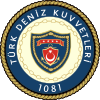| Underwater Offence Group Command | |
|---|---|
| Su Altı Taarruz Grup Komutanlığı (SAT) | |
| Active | 1963–present |
| Country | |
| Allegiance | Turkish Armed Forces |
| Branch | Turkish Navy |
| Type | Special Forces |
| Motto(s) |
|
| Engagements | |
| Insignia | |
| Abbreviation | SAT |
 |
| Components |
|---|
| Special Forces |
| Naval infantry |
| History |
| Equipment |
The Underwater Offence (Turkish: Su Altı Taarruz), or SAT, is the special operations forces unit of the Turkish Navy, and the first and only navy commando unit of the navy, consisting of highly skilled soldiers selected from among the officers and petty officers of the Turkish Navy. They are affiliated with the Naval Operation Directorate. During wartime, these units are responsible for carrying out stealthy attacks, sabotage, and raids on enemy strategic facilities including those located under water, over water, on land, or in the air. They also target floating platforms. The SAT participates in coastal reconnaissance tasked with obtaining information on coastal areas before deploying forces and maintaining control over foreign ports and underwater areas.
History
The first SAT course was conducted on 1962 in the city of Iskenderun, with its first trainees graduating in 1963. The original name of the SAT unit was Su Altı Komando (S.A.K.) ("Underwater Commando") and was bound to the Kurtarma ve Sualtı Komutanlığı (K.S.K.), or Rescue and Underwater Command.
In 1974 the SAT group command became bound to the Turkish Navy's General Command, and participated in the Turkish invasion of Cyprus later that year. They conducted the beach reconnaissance missions prior to the amphibious landing of the Turkish Armed Forces at Pentamili beach near Kyrnia (20 July 1974). Other publicised operations of SAT commandos are as follows:
- SAT commandos took part in the Imia crisis in 1996.
- In 2012, the SAT participated in Operation Ocean Shield, organized by NATO against piracy and rescued 7 Yemeni seafarers.
Mission
The SAT's main tasks are:
- Surveillance on enemy structures, facilities, defense systems or strategically relevant buildings.
- Covert sabotage against naval units and/or enemy structures.
- Covert landing and infiltration.
- Reconnaissance on behind-the-beaches being considered for amphibious landing operations.
- Determining secure landing paths.
- Direct action during first wave of landing missions.
- Counter-terrorism missions.
- Close quarters combat.
Training
To specialize in SAT, individuals must successfully complete the 50-week SAT (Marine Commando) course. The first phase of the course is eight weeks dedicated to physical and fitness development. Trainees who pass the rigorous physical and sea exams move on to the underwater phase, which lasts eight weeks. During this phase, they undergo frog-man training. After these phases are successfully completed, the land phase begins. In the land phase, it is called "hell week" after training on gaining a high level of land condition, swimming long distances in the water and getting on the boat, practicing VBSS, performing the task under pressure, getting rid of captivity, sea threats, long distance in the land, and finding targets. After intensive training, the land phase is completed. With these trainings, SAT specialists have the skills to sneak, sabotage and raid the enemy's coastal and floating targets. Then, the training mostly consists of tactical floating platforms and aircraft. SAT trainees will train for about 15 hours a day.
Equipment
Underwater Offence Command specialists' equipment includes:
Handguns
Submachine Guns
Assault Rifles
Machine Guns
Sniper Rifles
Rockets & Explosives
Gallery
-
A rigid-hull inflatable boat operated by the SAT unit transfers members of a visit, board, search and seizure team to the Military Sealift Command maritime prepositioning and force container roll-on roll-off and tanker USNS LCPL Roy H. Wheat (T-AK 3016) during the at sea portion of exercise Phoenix Express (PE 10).
-
Turkish marines on F470 zodiac boats and Spanish landing platform dock Castilla (L-52) during Destined Glory 2005 (Loyal Midas) military exercise, October 7, 2005.
-
Djibouti (Feb. 2, 2017) - Turkish Navy SAT members demonstrate tactical movements to Mozambique Marines during exercise Cutlass Express 2017. Exercise Cutlass Express 2017, sponsored by U.S. Africa Command and conducted by U.S. Naval Forces Africa, is designed to assess and improve combined maritime law enforcement capacity and promote national and regional security in East Africa.
-
ABIJAN, Cote d'Ivoire An Ivorian Sailor gives directions to Turkish Navy SAT assigned to the Maritime Security Centre of Excellence Mobile Training Team at the initial training meeting at the Ivorian Naval Base March 20, 2017.
References
- "SAT komandosu nasıl olunur?".
- "Eğitimlerini İstanbul'da yapıyorlar! Dünyanın en seçkin birliklerinden".
- "Kıbrıs Harekâtı'nın 45. Yılı". 19 July 2019.
- Newsroom (23 August 2019). "Former commando deployed in Turkey's Imia operation appointed commander of East Med naval base | eKathimerini.com". www.ekathimerini.com. Retrieved 21 July 2023.
{{cite web}}:|last=has generic name (help) - Atlamazoglou, Stavros. "How the US defused a deadly showdown between 2 NATO allies' special-operations forces". Business Insider. Retrieved 21 July 2023.
- "SAT Komandoları Harekâtta".
- "Su Alti Taaruz (SAT)". Shadow Spear. Retrieved 18 May 2014.
- "SAT komandolarının zorlu eğitimi - Galeri - Takvim".
- "Wayback Machine has not archived that URL". Retrieved 7 April 2023.
- "SAT komandolarının parolası: Başarmadan dönmek yok".
- "Sualtı Taarruz komandoları eğitimlerini aralıksız sürdürüyor".
- "Sualtı Taarruz Komutanlığı". Özel Kuvvetler. Retrieved 19 May 2014.
- "SAT Timlerine yeni makineli tabanca; CZ Scorpion EVO 3". 26 January 2022.
External links



